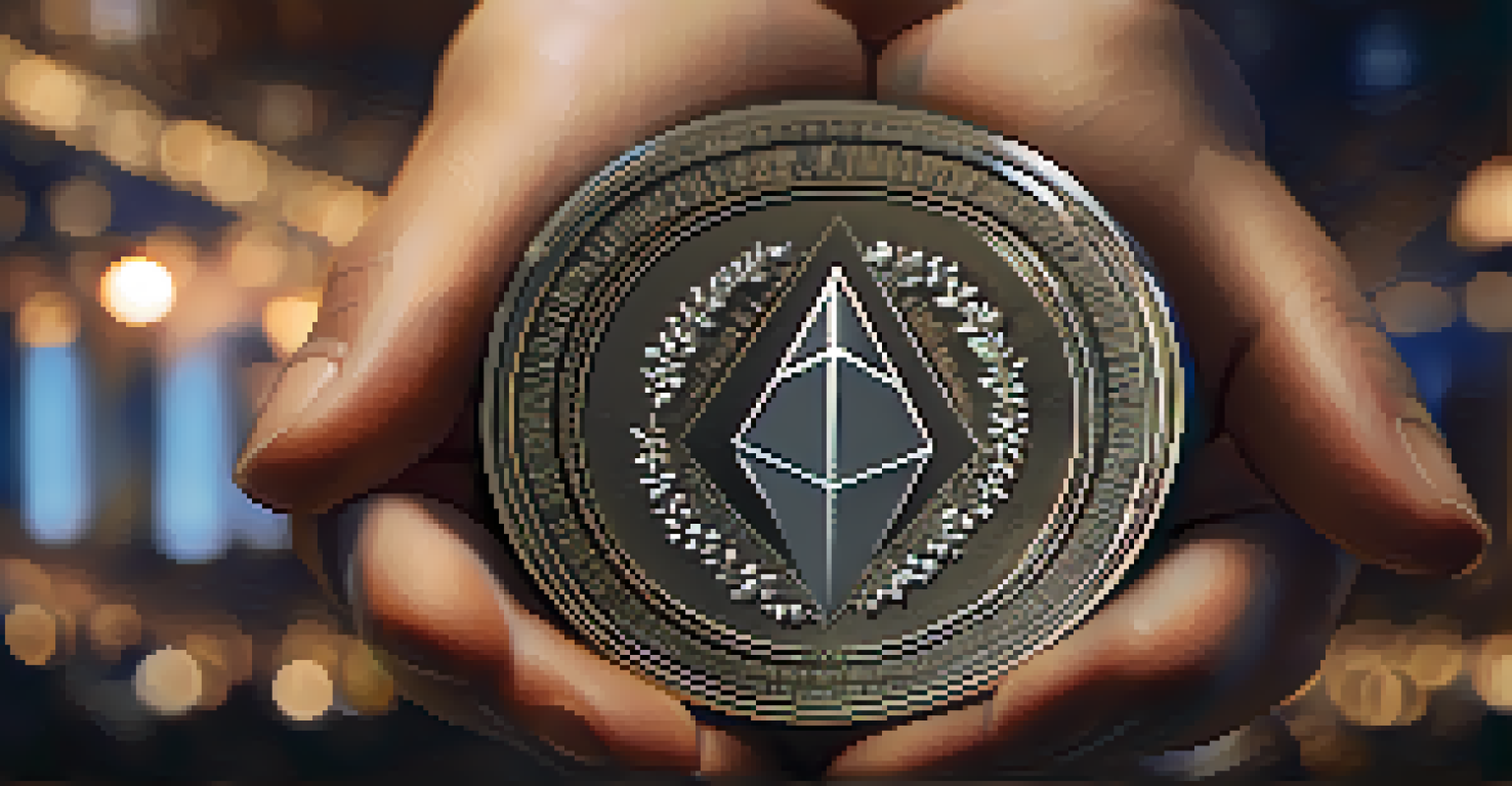Governance Tokens: Empowering Users in Ethereum Projects

What Are Governance Tokens and Their Purpose?
Governance tokens are digital assets that allow users to participate in decision-making processes within Ethereum projects. They serve as a bridge between developers and the community, enabling token holders to vote on proposals and changes. This decentralized approach empowers users, making them active participants rather than passive observers.
Decentralization is the future of governance, giving power back to the people instead of centralized authorities.
For example, when a project wants to implement a new feature or change its protocol, governance token holders can vote on whether to proceed. This means that the direction of the project is driven by the community's collective interests. In this way, governance tokens foster transparency and collaboration among participants.
As the Ethereum ecosystem grows, the importance of governance tokens becomes even more pronounced. They not only promote user engagement but also ensure that projects remain aligned with their communities' values and needs. This can significantly enhance trust and loyalty among users.
How Governance Tokens Function in Decision-Making
Governance tokens typically operate on a voting mechanism that allows holders to express their opinions on various issues. Each token often represents one vote, meaning that users with more tokens can have a greater influence on outcomes. This system encourages users to hold tokens long-term, as their stake in the project directly correlates with their voting power.

In practice, a user may receive governance tokens through participation in the project, like providing liquidity or staking. Once they possess these tokens, they can engage in governance forums or voting platforms to express their views. This interaction can range from simple votes on proposals to more complex discussions about the project's future.
Governance Tokens Enable Community Control
Governance tokens empower users to participate in decision-making processes, fostering transparency and collaboration within Ethereum projects.
Moreover, some projects implement tiered voting systems, where certain users might gain more influence based on their contributions or the duration of their token holding. This can lead to a more engaged community that feels genuinely invested in the project's success.
The Role of Decentralization in Governance Tokens
Decentralization is a fundamental principle of blockchain technology, and governance tokens exemplify this ethos. By distributing decision-making power among a diverse group of users, projects can avoid the pitfalls of central control. This decentralization helps ensure that no single entity can dominate the decision-making process.
A community is not just a group of people; it is a collection of individuals who are empowered to make decisions together.
For instance, in traditional organizations, a small group of executives might make all the critical decisions, often prioritizing their interests over those of stakeholders. Governance tokens change this dynamic by giving more weight to community voices. Each token holder can contribute to discussions, promoting a sense of shared ownership and accountability.
In this way, decentralization enhances the resilience of Ethereum projects. With a broad base of users involved in governance, the community can adapt to changes and challenges more effectively. This collaborative approach not only strengthens the project but also builds trust among its members.
Examples of Popular Governance Tokens in Ethereum
Several notable Ethereum projects use governance tokens to empower their communities. One such example is MakerDAO, which uses the MKR token to allow holders to vote on changes to the DAI stablecoin. This system exemplifies how governance tokens can directly influence critical financial mechanisms within the ecosystem.
Another example is Uniswap, a decentralized exchange that utilizes the UNI token for governance purposes. UNI holders can vote on proposals related to protocol upgrades, fee structures, and the allocation of resources. This democratic approach has helped Uniswap maintain its position as a leading decentralized exchange.
Decentralization is Key to Governance
Decentralization distributes decision-making power among a diverse group of users, preventing any single entity from dominating the governance process.
These examples illustrate that governance tokens are not just theoretical concepts; they are actively shaping the future of decentralized finance. As more projects adopt similar models, we can expect a shift toward greater user empowerment and community-driven innovation.
Challenges and Risks Associated with Governance Tokens
While governance tokens offer exciting opportunities for user empowerment, they are not without challenges. One significant issue is the risk of voter apathy, where token holders may not participate in governance activities. This can lead to decisions being made by a small, active minority, potentially sidelining the broader community's interests.
Additionally, governance tokens can create power imbalances, where users with larger holdings have disproportionate influence. This can discourage new or smaller investors from participating, creating a barrier to entry that undermines the democratic ethos of governance. It's essential for projects to implement mechanisms that encourage widespread participation.
Finally, the evolving regulatory landscape poses risks to governance tokens. As governments and regulatory bodies catch up with technology, they may impose restrictions that affect how these tokens function. Projects need to remain vigilant and adaptable to navigate these challenges while maintaining user engagement.
The Future of Governance Tokens in Ethereum Projects
The future of governance tokens in Ethereum projects looks promising, with innovation and experimentation at the forefront. As more developers recognize the value of community involvement, we can expect to see new models and frameworks for governance emerge. This evolution will likely enhance user engagement and broaden the scope of decision-making.
Moreover, with the rise of decentralized autonomous organizations (DAOs), governance tokens will play a crucial role in shaping how these entities operate. DAOs enable communities to self-organize and manage resources collectively, and governance tokens are the key that unlocks participation. This trend will further solidify the importance of user empowerment in the Ethereum ecosystem.
Challenges Threaten Governance Participation
Voter apathy and power imbalances can undermine the democratic ethos of governance tokens, highlighting the need for inclusive participation mechanisms.
Ultimately, the success of governance tokens will depend on their ability to foster inclusivity and transparency. As projects continue to prioritize community input, we can anticipate a more vibrant and resilient Ethereum ecosystem that benefits all participants.
How to Get Involved with Governance Tokens
Getting involved with governance tokens is simpler than it may seem. First, you’ll want to identify Ethereum projects that interest you and learn about their governance structures. Many projects provide resources and documentation to help newcomers understand how governance works, making it easier to get started.
Once you’ve selected a project, you can acquire governance tokens through various means, such as participating in liquidity pools, staking, or purchasing them on exchanges. Engaging with the community through forums and social media is also a great way to stay updated on governance proposals and discussions.

Finally, don’t be shy about casting your vote and sharing your opinions. Every voice matters, and your participation can help shape the future of the projects you care about. By actively engaging in governance processes, you contribute to a more democratic and inclusive Ethereum ecosystem.